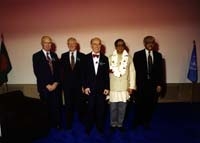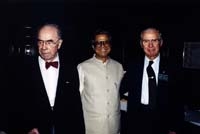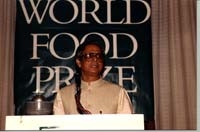| | 
1970 Nobel Peace Prize Laureate Dr. Norman E. Borlaug, 2002 Nobel Peace Prize Laureate Jimmy Carter, Mr. John Ruan, 2006 Nobel Peace Prize Laureate Muhammad Yunus and Bangladesh Amb. Humayun Kabir. | |
2006 Nobel Peace Prize winner Yunus was 1994 World Food Prize Laureate
(DES MOINES, IA) The Nobel Committee announced today that Dr. Muhammad Yunus of Bangladesh will receive the 2006 Nobel Peace Prize for his “efforts to create economic and social development from below.” Yunus’ international recognition began in Iowa—in 1994 he was in Des Moines receiving the World Food Prize. Often called “The Nobel Prize of Food and Agriculture,” Yunus was given the prize for providing loans to hundreds of thousands of Bangladesh’s poor to engage in subsistence farming. Yunus wasn’t the only Nobel Peace Prize winner at the event. Jimmy Carter, 2002 Nobel Peace Prize Laureate and a member of the World Food Prize Council of Advisors, and 1970 Nobel Peace Prize Laureate and World Food Prize Founder Dr. Norman E. Borlaug were on stage with Dr. Yunus as he received the World Food Prize in the Iowa State Historical Building. The prize was given on October 13, 1994—12 years to the day before he was announced a Nobel Peace Prize recipient. “The World Food Prize was the first internationally renowned award given to Dr. Yunus,” said Ambassador Kenneth Quinn, President of the World Food Prize Foundation. “The road to the Nobel Peace Prize began in Des Moines.” In accepting the World Food Prize, Dr. Yunus said, “I have been struggling to draw national and world attention to poverty and hunger issues for many years now. But I never thought I would be considered for the immensely prestigious World Food Prize.” He continued, “I look at The Prize not only as an endorsement of what I have done, I look at it as a thunderous endorsement of what we can all achieve – the creation of a poverty-free world in our lifetime.” Yunus’ work in microcredit, financed through the Grameen Bank, provided small loans to landless farmers to help them break the cycle of poverty. The anomaly of a traditional bank, the Grameen Bank is owned by very poor, who are also its primary customers. The Grameen Bank is the co-recipient of this year’s award. Current proponents of microcredit programs include the Bill & Melinda Gates Foundation, who recently announced the $150 million Alliance for a Green Revolution in Africa program in conjunction with the Rockefeller Foundation. Dr. Rajiv Shah, Director for Financial Services and Agriculture for the Gates Foundation, will be in Des Moines next week for the World Food Prize International Symposium discussing the program. The 2006 World Food Prize will be awarded on October 19 in the Iowa State Capitol to Edson Lobato and Alysson Paolinelli of Brazil, and A. Colin McClung of the United States. For more information, visit www.worldfoodprize.org. |





